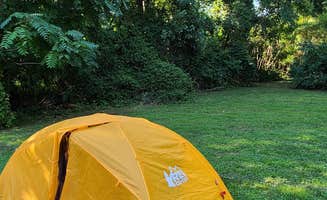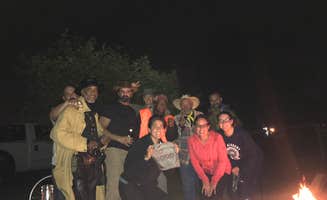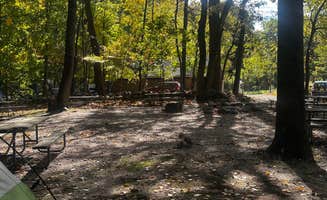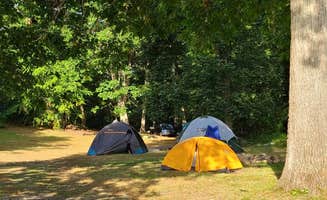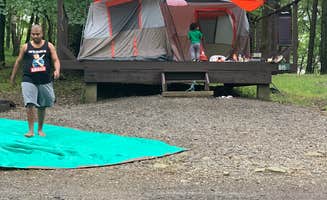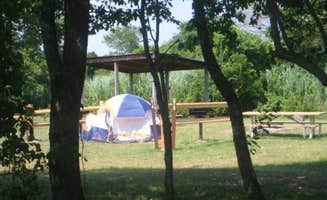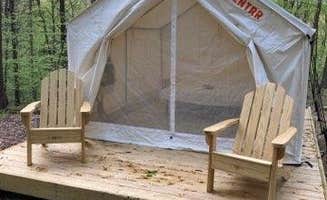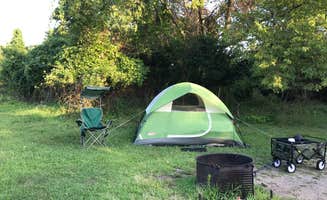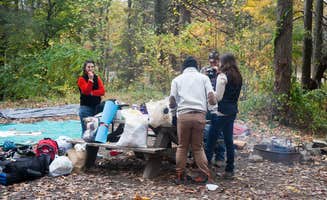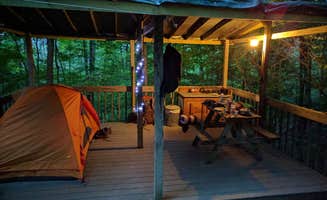Camping locations near Larchmont, New York offer diverse options within an hour's drive of this Westchester County community. The area sits at sea level along the Long Island Sound, creating humid summer conditions and mild winters compared to inland regions. Seasonal availability varies significantly, with most tent camping areas operating from April through October when overnight temperatures typically remain above 40°F.
What to do
Hiking trails and nature areas: Ward Pound Ridge Reservation features over 40 miles of trails across various difficulty levels. "There are elevation gain, creeks, and open fields for stargazing. You have the options of a lean to here," notes Seth K. The reservation's extensive trail system accommodates hikers of all abilities and includes designated paths for horseback riders.
Swimming and beach access: Access to water activities varies widely between campgrounds. At Croton Point Park, "there is a large dog run and a decent playground for young kids," according to Thomas. The park includes "a private beach which is opened from Wednesday to the weekend with life guards on duty," as Anil S. points out, providing scheduled water access during summer months.
Winter activities: While many campgrounds close during colder months, some remain operational year-round. Several parks transition to winter recreation areas after camping season ends. "We came here to hike Hudson Highlands State Park while we were on 5 week assignment working in NY," explains Jenny K. about her stay at Clarence Fahnestock State Park, which offers winter hiking and cross-country skiing opportunities from December through March.
What campers like
Urban proximity with nature access: Many campers appreciate the balance between city access and outdoor experiences. "About 30 minutes from sleepy hollow and tarrytown NY and only an hour to central park!! Deer running everywhere and surprisingly beautiful and quaint," says Megan B. about Beaver Pond Campground in Harriman State Park, highlighting the relatively short drive to Manhattan.
Wildlife viewing: The suburban campgrounds offer unexpected wildlife encounters. At Beaver Pond, Brian O. notes the campground is "laid back away from the busy activity of the big city. If you want to get away and relax you can come here to walk, swim and camp." Campers frequently mention deer sightings at dawn and dusk, particularly during spring and fall seasons.
Platform camping options: Several campgrounds offer raised platforms for tent camping, which prove especially valuable during wet conditions. At Beaver Pond, "Many of the camping options were on platforms which is especially nice if it recently rained or if you are expecting rain during your stay," according to Ethan K., providing a practical advantage for spring camping when ground moisture levels are typically higher.
What you should know
Reservation requirements: Most campgrounds in the area require advance bookings, especially during peak season. At Ward Pound Ridge Reservation, "The one downside is that you need to book in person but it can be done well in advance if need be," explains Paul R. Many sites release reservations between 3-6 months in advance, with summer weekends filling quickly.
Noise considerations: Proximity to urban areas means some campgrounds experience significant noise. At Croton Point Park, Jonathan C. cautions that "The site was very loud (dance music) until after 11pm. Quiet time at 10pm." He recommends to "try to stay away from this end of the site or choose a site away from other bookings if you'd like quiet."
Bear activity: Wildlife management protocols exist at several area campgrounds. Steve W. recounts his experience at Beaver Pond: "'Welcome to Bear Mountain' grumbles the park ranger as he sits in complete darkness! He is in his ranger hut, checking in the late evening arrivals to the campground... He offers us a highlighted map to our site, wishes us a good stay, and gives us the run down on bear activity in the area." Bear-proof food storage is required at most Harriman State Park camping areas.
Tips for camping with families
Playground proximity: When selecting sites for family camping, consider proximity to play areas. At Blydenburgh County Park, Thomas mentions a "playground within sight of our camper," allowing parents to supervise children easily while maintaining their campsite. Several other parks have updated play equipment suitable for various age groups.
Off-season camping: Families seeking quieter experiences should consider non-summer visits. Rebecca S. noted about Beaver Pond, "Ranger said that during summer weekends the grounds fill up and can be quite noisy, but mid-week during the off-season it was great." September and early October weekdays typically offer reduced crowds while maintaining comfortable temperatures.
Nature programs: Several parks offer educational programming specifically for children. "The Trailside Nature Museum is also fun for the kids," mentions Ming R. about Ward Pound Ridge Reservation, which runs seasonal naturalist-led programs on weekends from May through September focusing on local ecology.
Tips from RVers
Proximity to public transportation: For RVers planning to visit New York City, consider locations with transit access. At Liberty Harbor RV Park, "The light rail is a block away, and the path train is about 8," according to Joe R. Keith and Tia S. add, "Pick one of the larger end row sites to get a little extra elbow room. If it's packed, your neighbor with be within inches of your rig."
Water and power limitations: Many campgrounds offer limited hookup options. Kevin A. describes Liberty Harbor: "The sites had electric and water and were in a fenced off section of the marina parking area. It was a little loud with city noises, but exactly what we expected being so close." Most RV sites in the region offer 30-amp service, with 50-amp connections available at only select locations.
Parking considerations: Navigation challenges exist for larger RVs. "It took me 35-40 minutes to unhook sewer, power, water, attach the fifth wheel to my truck, put the slide-outs in, unlevel everything, re-park the trailer 20 feet away," explains Matt S. about his experience moving sites at a local campground. Height restrictions on parkways limit travel routes for taller vehicles throughout the region.


